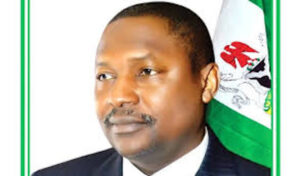Post Views: Visits
62
The Economic and Financial Crimes Commission (EFCC) has filed an additional seven-count charge against a former Attorney-General of the Federation, Mr Mohammed Adoke, over money laundering allegations amounting to about N400 million.
The trial of Mr Adoke which was meant to begin today was stalled due to the amended charges.
Mr Adoke was earlier arraigned alongside an Abuja-based businessman, Mr Aliyu Abubakar, before Justice Inyang Ekwo of the Federal High Court in Abuja on June 17, 2020, on allegations of money laundering.
Of the initial seven-count charge, six of them were related to Mr Adoke.
As the trial resumed, the prosecutor, Bala Sanga, informed the court of an amended charge he filed on July 29 which was served on all the defendants.
Justice Ekwo frowned at the late filing of the amended charge and moved to adjourn the trial till Tuesday on the ground that he is yet to sight the amended charges.
The EFCC, in the former seven counts, alleged that Adoke and Abubakar committed the money laundering offences totalling over N400 million in Abuja in September 2013.
In the counts relating to Mr Adoke, he was accused of among others, receiving the dollar equivalent of N300 million from Abubakar, paying the dollar equivalent of N367,318,800 to one Usman Mohammed Bello, and allegedly using the sum of N300 million, which was alleged to be part of the proceeds of unlawful activities, all in violations of various provisions of the Money Laundering Prohibition Act, 2011.
The former AGF was also accused of making “structured cash payments, in 22 tranches” amounting to N80 million, another of such structured payments in 13 tranches summing up to N50 million into his Unity Bank account.
The EFCC further alleged that the funds were not only part of the proceeds of unlawful acts but they also exceeded “thresholds outside a financial institution,” and that the payments were done with the intention of concealing the origins of the funds contrary to Section 15(2(a) of the Money Laundering Prohibition Act 2011 and punishable under section 15(3) of the same law.
Related
Source: thestreetjournal.org



